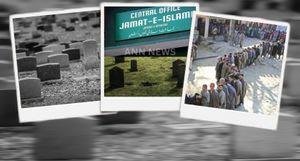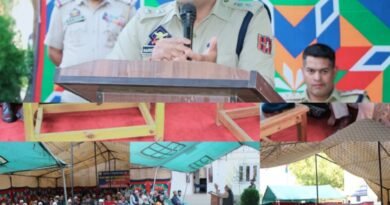“Hum Kya Chahte Azadi” Buried, as Former Jamaat-e-Islami Decide to Join Mainstream Politics
Tariq Bhat
Former Jamaat-e-Islami banned Organisation have decided to join mainstream politics, marking a significant shift away from their previous stance.

This development has the potential to be advantageous if these individuals are managed well and given national responsibilities, as they could play a positive role in the region.
Many experts view this as a major setback for those who have tried to drag Kashmir back into violence. They believe that integrating these banned Jamait people into mainstream politics could serve as a powerful counter-narrative to separatism.

Experts highlight that those who once chanted “Hum Kya Chahte Azadi” and pushed the Pakistani agenda in Kashmir can now serve as examples to the youth who were misled by these same figures.
These people who once targeted and killed innocent people for participating in politics, are now seen as hypocrites pursuing personal gains, profiting from external enemies, and pushing Kashmir into turmoil.
Political analysts suggest that allowing these individuals to participate in mainstream politics could expose their hypocrisy to the younger generation.
A professor from a local college expressed no surprise at these individuals joining politics, noting that many young people now criticize them for misleading the public while engaging in the very electoral process they once condemned.
This shift underscores that their calls for “Azadi” were merely a facade to earn money from foreign adversaries, making them complicit in the violence that has long plagued the region.
Jamaat-e-Islami’s decision to enter politics is seen as a potential setback for external enemies, yet it is crucial to maintain vigilance over their actions within the political arena.
This move represents a complex and significant development in Kashmir’s political landscape, one that experts believe must be carefully managed to ensure it contributes positively to the state’s future.
Are these people accountable to the people they once misled? Before the abrogation of Article 370, Jamaat-e-Islami declared elections as “Haram.” Now, as the political tables turn, what does this shift mean for them? Are they prepared to answer to the people, or will the silence of those lost in the conflict remain unbroken?
This development raises critical questions about accountability, integrity, and the true intentions of those who once thrived on the narrative of separatism.
(In the news article, I have spoken to numerous individuals, including political experts and top officials. The article is based on thorough research. While some people may agree and others may disagree, I have done my best to inform readers about their past and present.)




